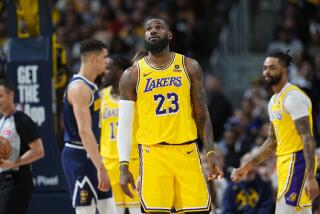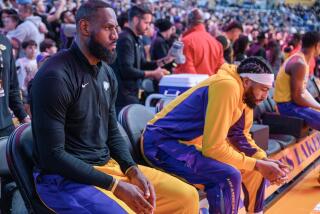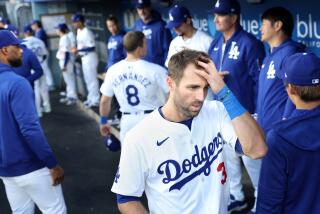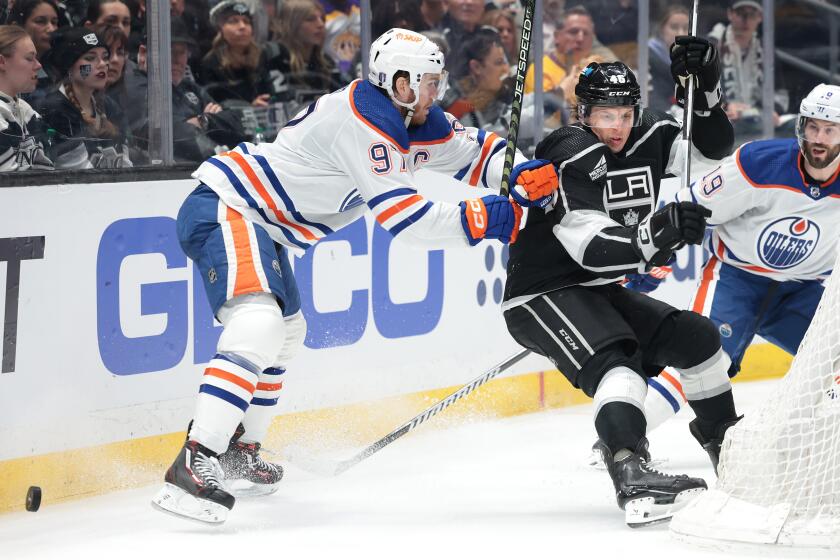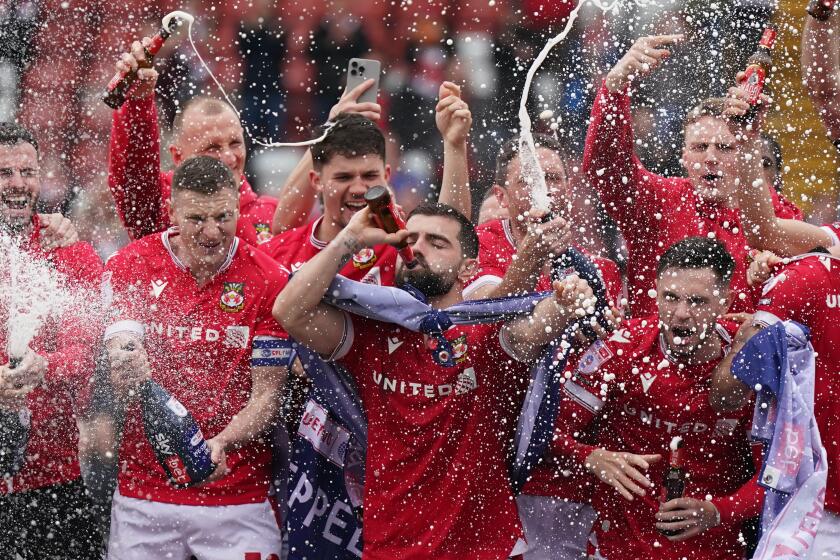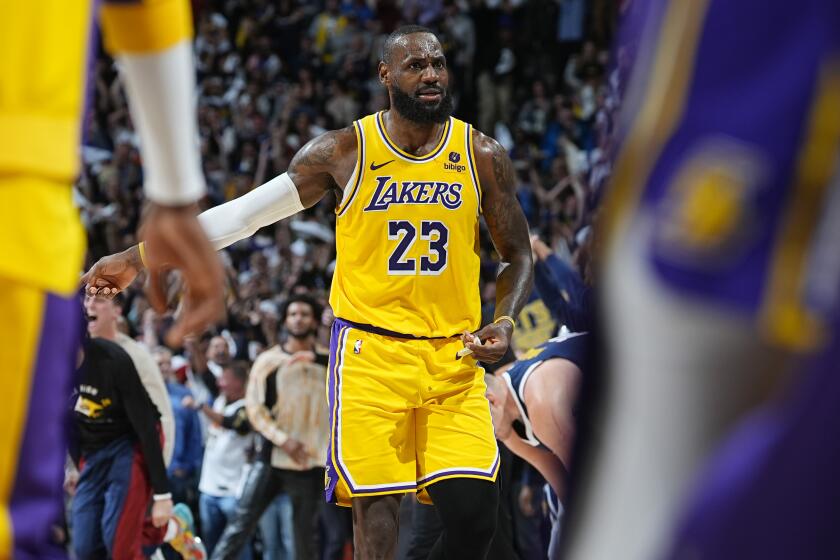End of Route for 66
He scored a goal in his first game and a goal in the game that turned out to be his last. In between, Pittsburgh Penguin center Mario Lemieux saved a shaky franchise, won six NHL scoring titles, three most-valuable-player awards and two Stanley Cups and redefined the concept of courage in athletic competition.
Lemieux recorded a goal and an assist Saturday, but his valor was not enough to prolong the Penguins’ season. With Pittsburgh’s 6-3 loss to the Philadelphia Flyers before a record crowd of 20,009 at the CoreStates Center came the Penguins’ elimination after five games of their Eastern Conference quarterfinal playoff series and the end of a brilliant career for Lemieux, who conquered Hodgkin’s disease but lost the will to battle the brutish defensive tactics inflicted upon star players in the NHL.
“There are a lot of great players in this league and if they [NHL executives] can apply the rules a little bit and let some of the greatest athletes in the world use their skills, it would be great,” said Lemieux, who ranks sixth on the NHL scoring list with 613 goals and 1,494 points--totals that might have been greater if he hadn’t undergone back operations in 1990 and 1993 and missed the 1994-95 season while recovering from his cancer treatments.
He made his decision last September and never wavered, even though he led the NHL in scoring this season with 50 goals and 122 points. Nor will he return for the 1998 Olympics at Nagano. “The way I’ve been playing the last couple of years has been very frustrating,” said Lemieux, who nonetheless came back from his enforced sabbatical to lead the NHL in scoring the past two seasons.
“All of a sudden, not to be able to challenge a guy one on one--I’ve always been able to beat someone one on one, if I wanted to. That’s frustrating and something I can’t accept.”
As he skated off for the final time Saturday, his eyes were teary from a warm send-off from fans who support the Penguins’ most intense rival yet can recognize Lemieux’s accomplishments. It was in Philadelphia, he recalled, that he played his first game after his first cancer treatment in 1993. Fans in the city that once booed Santa Claus opened their hearts to him then, as they did again Saturday.
“I really have some mixed emotions about tonight. After all, I’ve been playing the game since I was 3 years old and it’s a part of me,” said Lemieux, whose incomparable puckhandling skills and 6-foot-4, 220-pound physique made him a nearly unstoppable offensive force and one of only seven players in NHL history to score 600 goals. “But . . . I was awful [in this series]. I didn’t have my legs. I didn’t have any strength the last month of the season. It’s something I don’t want to have to go through again. . . .
“The fans here were great to me and I have nothing but great memories of Flyer fans. They’re able to appreciate what you’re trying to do out there. Once I announced I was retiring, everybody was my friend. Maybe I should have announced it sooner.”
And maybe he went too soon. He’s only 31 and he has three years left on a $42-million contract, much of that in deferred payments. “But I have a lot of mileage, though,” he said, smiling.
Only those who know him well can comprehend how difficult it was for him to travel many of those miles.
Flyer defenseman Paul Coffey, who played for the Penguins in 1991--when they registered the first of their two consecutive Cup triumphs--recalled times when Lemieux’s back was so painful, he couldn’t bend over to put on his equipment. “They had a little bench made up for him and guys helped him with his skates,” Coffey said. “Then out he would go and play because he loved the game. He was awesome to play with, like playing with Wayne Gretzky. You just think it’s never going to end.”
Said Lemieux’s linemate, Ron Francis: “We’ve had a lot of new faces in the last few years and some of these guys weren’t here then, and maybe they don’t grasp how big this is. . . .
“I was there during his [cancer] treatments, when he flew here to Philly and played. It’s just been a privilege to play with him. I’ll treasure the friendship and memories he’s given me.”
Lemieux, who plans to take a year off to relax and spend time with his family--he and wife Nathalie expect their fourth child this summer--said he would like to be remembered as a winner. “As somebody who started with the worst team in the NHL in ’84 and was able to win the Stanley Cup seven years later,” he said, “that was a big challenge and that’s something I’ll be able to take with me and cherish.”
To Coffey, there’s little doubt Lemieux won what he wanted in hockey, with two Stanley Cups, and in life, with renewed health. Coffey wanted to express that to Lemieux as they met in the traditional handshaking line that concludes every playoff series, but he couldn’t find the words.
“There were 10 or 15 seconds before you get to him on the line, and a bunch of things go through your mind,” Coffey said. “Then all I asked was, ‘Are you happy?’ He said, ‘Yeah,’ and I said, ‘Good, because you deserve to be happy.’ He had this look in his eye, that he was at peace.”
He deserves that much in return for all he gave the game.
(BEGIN TEXT OF INFOBOX / INFOGRAPHIC)
SUPER MARIO: RECORD-BREAKING CAREER
1984-85
On his first shot in his first shift of his first NHL game, scores goal against Boston goaltender Pete Peeters.
Becomes only third rookie in history to score 100 or more points.
Named rookie of the year.
1985-86
Finished second in league with 141 points.
Finished second to Wayne Gretzky in most-valuable player award voting.
1986-87
Sat out 17 games because of a sprained knee and bronchitis but still finished third in the league with 107 points.
1987-88
Led league with 168 points and MVP award
1988-89
Scored 85 goals to become the second player in history with more than 70 goals in two seasons. (Gretzky is the other.)
Led league with 114 assists to become only the third player with 100 or more assists in a season (Gretzky and Bobby Or).
Won second consecutive scoring title with 199 points.
Set NHL record with 13 short-handed goals
On Dec. 31 against New Jersey, became the first NHL player to score an even-strength, power-play, short-handed, penalty shot and empty-net goal in the same game.
1989-90
Despite sitting out 21 games because of a back injury, finished fourth in scoring with 123 points.
1990-91
Sat out the first 50 games of the season after back surgery.
Pittsburgh wins Stanley Cup.
Named MVP of the playoffs.
1991-92
Won scoring title with 131 points, despite sitting out 16 games because of a back injury, flu and bruised shoulder.
Scored 1,000th point in 513th game, the second-fastest in history (Gretzky, 424).
Pittsburgh wins Stanley Cup.
Named MVP of the playoffs for second consecutive season.
Tied NHL playoff record with five game-winning goals.
1992-93
Despite sitting out 24 games because of Hodgkin’s disease, won his fourth scoring title with 160 points, third-highest of his career.
Named NHL’s MVP for second time.
1993-94
Played in only 22 games because of back problems, scoring 37 points.
1994-95
Sat out the entire season because of medical problems.
1995-96
Named MVP for third time.
Led NHL in scoring for fifth time with 161 points.
Scored 500th goal in 605th game, second-fastest in history to Gretzky (575). Gretzky is the other.
1996-97
Became ninth player in NHL history to score 1,400 points.
Became seventh player in NHL history to score 600 goals.
Won his sixth scoring title with 122 points.
Recorded his 10th 100-point season, second highest in NHL history.
At season’s end, he ranked sixth on the all-time points list with 1,494, sixth on the all-time goal list with 613 and 11th in assists with 881.
(BEGIN TEXT OF INFOBOX / INFOGRAPHIC)
Scoring Machine
Career statistics for Mario Lemieux:
Regular Season
*--*
Year GP G A Pts 1984-85 73 43 57 100 1985-86 79 48 93 141 1986-87 63 54 53 107 1987-88 77 70 98 168 1988-89 76 85 114 199 1989-90 59 45 78 123 1990-91 26 19 26 45 1991-92 64 44 87 131 1992-93 60 69 91 160 1993-94 22 17 20 37 1994-95* 1995-96 70 69 92 161 1996-97 76 50 72 122 Totals 745 613 881 1494
*--*
* Did not play--injured
Playoffs
*--*
Year GP G A Pts 1988-89 11 12 7 19 1990-91 23 16 28 44 1991-92 15 16 18 34 1992-93 11 8 10 18 1993-94 6 4 3 7 1995-96 18 11 16 27 1996-97 5 3 3 6 Totals 89 70 85 155
*--*
More to Read
Get our high school sports newsletter
Prep Rally is devoted to the SoCal high school sports experience, bringing you scores, stories and a behind-the-scenes look at what makes prep sports so popular.
You may occasionally receive promotional content from the Los Angeles Times.
